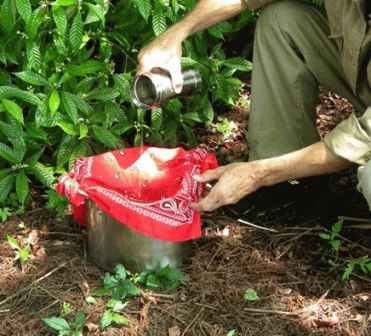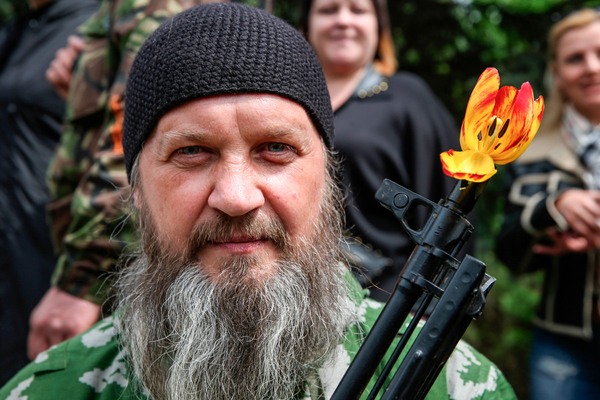
a patriot, refugees and hatred for Russia: reporting from the frontline towns of Ukraine
Very soon, 31 Martha, Ukrainians have the opportunity to once again change the destiny of his country. The country will hold presidential elections, which will determine the future of the country and its citizens in the years. But not everyone in Ukraine are ready today to make a choice and go ahead, I did not deal with its recent past. to understand, than today lives Ukraine and the unrecognized republics of Donbass, then fear and the dream of ordinary people, "Lenta.ru" asked the journalist Igor Rotar share impressions from a trip to South-East.
Then do not talk to strangers
About, my trip to Ukraine will not be easy, I realized even in the US, when he began to get ready to go.
"Well no, Lviv my friends will not communicate with a Russian journalist - is excluded!"- I have a friend in Kiev stunned reporter.
After that, agreeing on renting an apartment in Donetsk region (territory, controlled by Ukraine), I introduced myself to an American journalist (it is also true) Russian origin and failure again. "Will you write about, that we are right up there (on the territory of the DNI / LC) kill! We hate you, Americans, same, and how “Ukropov”. I do not have housing for accomplices of murderers!"- she wrote me a local woman.
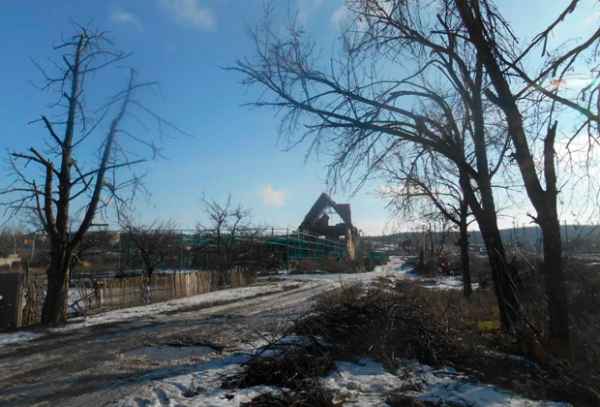
The village Semenovka (Prigorodni Slavianska) in winter 2015. Now traces of past damage is almost gone
Then I decided to speak, just I am writing a book about Ukraine. But, as soon as I asked the Hungarian journalist from Transcarpathia about, if any of the local Hungarians advocates autonomy, the connection was lost. Since then, my would-be interlocutor never again picked up the phone.
With the same result ended my dialogue with the representative of the Ukrainian Christian organization, helping refugees from South-East. Just me in an interview not denied, but wrote some very vague answers and even refused to give a phone number. In the end,, After days of correspondence, Christian gave me the phone to some other charitable organization. It seems to me, it scared off the, that I was not only interested in the problems of people, but also their mood.
- Support for autonomy - is separatism, ie criminal article, and the question about the mood in the region, where the security service catches "supporters of terrorists", very slippery, we must be very careful in dealing with people, - explained to me the specifics of the local Ukrainian human rights activist.
"We have that white, the red "
His visit to Ukraine I decided to start with the Slavic. For Ukraine, it is a city landmark. Right here, as well as in the neighboring Kramatorsk, spring 2014 It started the confrontation of the Ukrainian army and militia under the command of Igor Strelkov. In the summer of that year, the city came under the control of the Kiev authorities. I was in Slavyansk and Kramatorsk (as in other cities of the Donbas) in winter 2015, and I was wondering, what has changed here since.
In the preceding my trip I have found the monuments to Lenin in Slavyansk, and Kramatorsk. true, they did not look quite usual. Slavic Ilyich hung on the chest plate: "I killed 20 millions ", and Kramatorsk Lenin was decorated in the Ukrainian flag, and he looked like a punk. However, it was a half-measure, and Ukrainian radicals in both cities demanded to demolish the monuments. Slavic deputies voted against the demolition, and then the fighters of the "right sector" was demolished a monument to themselves. In Kramatorsk, they even did not wait for the results of voting and the statue was dismantled a few days before the City Council session.
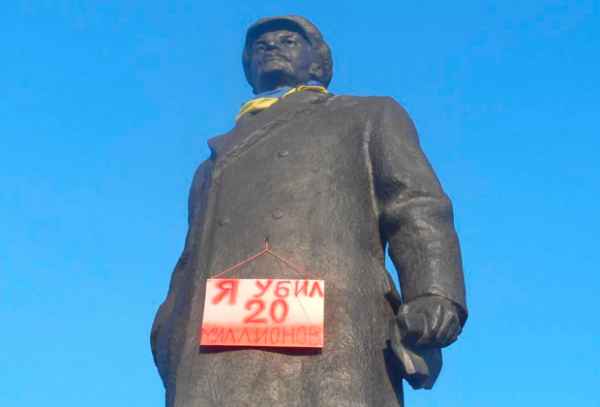
Monument to Lenin in Slavyansk 2015 year
"City - something like Gogol's Mirgorod; There is a hairdresser and watchmaker, that is, you can count, that years later 1000 Slavyansk will phone home ... look out friendly and kindly, in the manner of complacent grandmothers ", - describes Slavyansk Chekhov visited here.
Today the city has and communication, and internet, but the provincial spirit still fills life Slavyansk. This provincialism explains the political and the plasticity of the locals. In an interview many of them innocently talked with me, what, when they watch Russian television, they are for Russia, and when the Ukrainian - for Ukraine. "We sho white, sho red - if only paid pennies ", - the most frequent response to the question of political preferences.
At the time, former Prime Minister of DNR Alexander explained Boroday, that the choice of Slavyanska like center of resistance was made by chance. In his opinion, Slavyansk, in contrast to the large regional center of Donetsk, It was the best place to start armed struggle. I think, that the main reason for this decision - suggestibility not too educated and deeply apolitical local inhabitant. So, in times of, when the city is controlled by militias, the streets were posters: "If you do not want, to your wife and children were in the filtration camps - engage in militia!"And the people believed it and went to fight against the" fascists ".
Such relatively small (under 100 thousands of residents) The city is very, very much in the Donbass. With the exception of Transnistria, Soviet past is strongly felt, than anywhere else in the former USSR. It is in these towns lived most "Vatnikov" - pro-Russian, latent separatism supporters.
"Too many rednecks"
"Covkovost" donbasstsev became a byword throughout Ukraine. Here are the arguments used in the air of Ukrainian television ATU fighter from the Western Ukraine, proving, that they do not fight with the local militia, and a regular Russian army: "Donbasstsy - these are immature people, they even car really do not know how to drive. obviously, that if not for Russia, we have such a long time people have won ".
Alas, Something similar can be heard from well-educated people of Kiev. So, Kiev My friend - a businessman - was terribly outraged by the annexation of the Crimea, but I did not grieve about the possible loss of Donbass, because "there are too many rednecks". Not surprising, what, to put it mildly, disrespectful attitude repels the Donbas residents Ukraine.
Today, traces of past war in Slavyansk not seen. Many good shops (there is even a zoo), a variety of restaurants and coffee shops. by the way, at some point I even thought, I was in the US.
At first, highly sorts burgernyh. Often come across "pirate" "McDonalds" (here they are called MacBurger), Similar to the classic as two peas, but with an inverted M on input. Secondly, cafe menu abounds in both English words (eg, coffee, tea), and English words: let us say, instead of "milkshake" written in Cyrillic "milksheyk". Very amused local advertising on a bizarre mixture of English to Ukrainian: "Vizmy its freshkartku and buy more advantageous".
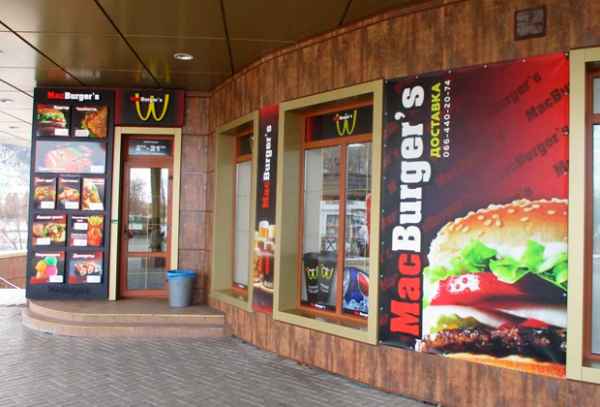
However, About, that the atmosphere in the city is far from happy, you can guess from the wall creativity in the doorways. So, eg, on one of the walls adorned slogan "Glory to Ukraine!», but at some point in the first word was replaced with a "shame", and then and completely slipped his paint.
The most heavily damaged during the war, a suburb of Slavyansk Semenovka. When I was here four years ago,, the village resembled Stalingrad during World: It was destroyed approximately 70 percent of homes. Today, almost completely restored Semenovka. About the former tragedy resembles a half-effaced inscription at the bus stop: "We have come to kill", mental hospital destroyed by the Germans with the reduced children's section and a few abandoned houses.
- Housing restored the international organizations, foreign embassies, religious organizations, but the Ukrainian authorities. We are also known cases, when people would be compensated, - tells me the employee volunteer organization, working with refugees (officially - IDPs) Catherine Khanevo.
- People living in apartment buildings received compensation for destroyed housing. In the private sector, the people began to rebuild their houses themselves, and often can not be established, that it was destroyed, - responds to this criticism, the main expert of the press center of the administration of the Slavyansk Darya Kuzmina.
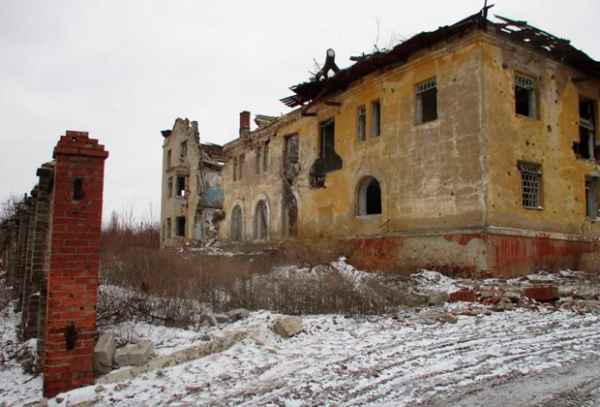
Housing destroyed in the mental hospital Semenovka
But even those, whose homes seems to be restored, still unhappy:
- Yes, helped us, but before we had a huge house, and now vremyanka.
- And you do not accidentally Czech? - come on to me not quite sober little man in a torn quilted jacket. - The Czechs have given me some shifirinok, and all the basic self. Enough money only on the hut to the outhouse on the street!
My question is about the presidential election preferences causes most Semenov dull irritation: "Let us whom. No one believe ".
"There is still killing people!»
People from "Prolisok" humanitarian organization (the Ukrainian - snowdrop) Kharkov jokingly called "kamikaze". By own car, often under fire, they get in the most dangerous places in the conflict zone. Distribute there products to civilians, trafficked women and children.
- In the world there are many people think, that the war is over in Ukraine, but in fact it is nonsense! Battles are constantly, still killing people, - convinces me head "Prolisky" Evgeny Kaplin. According to him, directly to the contact zone of the warring parties is home to about a million people.
There is a catastrophic shortage of physicians, huge problems with the delivery of humanitarian assistance - people often just starving. It is not surprising, that the majority of the inhabitants of the frontal zone is not too favor power.
- It seems to me, that people do not go to vote. They already do not trust anyone! - says Eugene.
It is also interesting, that according to the sociological service of the Razumkov Center, any compromises for the sake of peace in the Donbass agree only 16 percent of the population of Ukraine, but these are three times more among the inhabitants of the "Ukrainian" Donbass - 46 percent.
"Here lives an agent of the Russian world"
It will not go away and the atmosphere of fear, nervousness and suspiciousness. Я мило беседовал о жизни c сотрудницей отдела регистрации недвижимости администрации Cлавянска, но как только я спросил женщину о ее политических взглядах, ее лицо стало каменным: «Я не говорю и не пишу о политике, так как работаю в государственных структурах, one “неверное” слово и меня уволят тут же».
Служба Безопасности Украины до сих пор выявляет граждан, сотрудничавших с ополченцами во время войны. Причем тюремный срок можно получить не только за участие в боевых действиях, но даже за работу кухаркой у сепаратистов.
Такую политику силовых структур трудно назвать разумной. Ведь Киев по-прежнему хочет вернуть себе контролируемую сепаратистами часть Донбасса, and there are hundreds of thousands have arrested this approach.
Furthermore, as reported to me wished to remain anonymous defenders, Activity of the Security Service of Ukraine sharply, когда нужно обменять очередную партию пленных украинских военных. В такое время для ареста людей «чекисты» ищут любой повод. Человека могут задержать только за то, что у него нашли сепаратистскую листовку или же за то, что он поделился с родственником информацией о продвижении войск. Может быть сказанное правозащитниками и неверно, но в то, что украинские «чекисты» умышленно арестовывают людей для обмена, в Донбассе верят многие.
However, there are those, who believes, что силовые структуры выявляют «сепаров» недостаточно активно. So, sometimes anonymous activists hung out on the flats "unreliable citizens' plates: "Here lives an agent of the Russian world". true, Police press service has said, that such actions are illegal patriotic.
AND, finally, main argument apolitical Donbass layman against the authorities - is a sharp decline in living standards after Maidan. But unlike zapadentsev, in the east of the country no one is willing to make such sacrifices for the sake of reducing Russian influence. Today in the Ukrainian Donbass common joke: "Why would topple Yanukovych? The dollar rose to three times, and two communal? Yes, it was possible to negotiate with him!»
Both worse
When such sentiments do not seem surprising donbasstsev preferences in the upcoming presidential elections. According to the results of sociological research company Seetarget, 31 the percentage of voters in Donetsk region is going to vote for a politician Yury Boiko (Yanukovych's former fellow party member, people from Medvedchuk's team, - ca.. "Lenta.ru"). На втором месте актер Владимир Зеленский с 28 процентами, и лишь на третьем — действующий президент Петр Порошенко — за него готовы отдать голоса 15,5 процента местных избирателей.
Recall, что Юрий Бойко выступает за прекращение военных действий и «примирение» с Россией. Владимира Зеленского поддерживает «протестный электорат», разочаровавшийся в украинской политике в целом. In other words, без малого две трети донбассцев не поддерживают не только действующего президента, но и весь нынешний украинский политический истеблишмент.
By the way, похожая картина в соседней с Донецкой Харьковской области. Здесь за Юрия Бойко готовы проголосовать почти 20 процентов избирателей. После него в рейтинге располагаются Юлия Тимошенко и Владимир Зеленский (by 15,5 процента у каждого), а затем действующий президент Порошенко с девятью процентами.
Между тем на Востоке понимают, что их голоса едва ли будут решающими, и окончательный выбор все равно будет между Тимошенко и Порошенко. С точки зрения же жителей этой части Украины они одинаково плохи, поскольку как минимум не приветствуют сближения с Россией, and, что хуже, выступают «за войну до победного конца». То есть не стоит рассчитывать, что после выборов негативное отношение восточных украинцев к действующей власти изменится.
Плохо для России — хорошо для Украины
В то же время было бы ошибкой считать, that all the inhabitants of Ukrainian Donbass not support Poroshenko policy. So, of the same opinion poll should be, that euromaidan ideas shared by at least a quarter of the residents of Donbas. true, in the nuances of the political platforms of the same Tymoshenko and Poroshenko they do not protrude. Most use simple logic: what is bad for Russia - good for Ukraine.
- I for Gunpowder (so called in the Ukraine Poroshenko - a comment. "Lenta.ru") for one reason - because of all the presidential candidates, Putin hates most is his! Well, Petro Oleksievich means necessary to support the! - I explained to me their political preferences of one donbasstsev.
The son of the owners, from whom I rented an apartment in Slavyansk, Before the war he studied at the Faculty of Law of the University of Donetsk, но после начала военных действий решил, что сейчас «не до учебы», и записался в украинскую армию добровольцем. Причем этого парня язык не поворачивается назвать солдафоном — он хорошо воспитан, всесторонне образован, неплохо говорит по-английски. Но при всем этом он не скрывал своего радикализма. So, eg, он с восторгом рассказывал, что в Днепре (бывший Днепропетровск — прим. "Lenta.ru") можно крикнуть на улице «Слава Украине!», и кто-нибудь обязательно ответит: "Glory to heroes!», а в Славянске, к его глубокому сожалению, такого поступка в лучшем случае не поймут.
Как мне показалось, average, донбасские патриоты менее «совковы» и образованней своих пророссийских оппонентов: eg, очень активно поддерживают действующую власть сотрудники библиотеки Славянска. И вовсе не потому, что работникам бюджетной сферы так положено. Их настроения вполне искренние, что подтверждается высокой гражданской активностью, свойственной волонтерам и активистам.
Украинцы и хохлы
Восток Украины считается русскоязычным, but to say, что в Донбассе вовсе не говорят по-украински, было бы неправдой. В селах Донбасса можно встретить достаточно людей, говорящих на украинском. Они даже учились в украинских школах, true, не совсем правильной «мове» (Like so, как в школах канадского Квебека изучают местный французский). Reached, что восточные украинцы, когда приезжали в Западную Украину, вынуждены были говорить по-русски, так как иначе их там просто не понимали. Тем не менее в сельском Донбассе есть люди, которые считают своим родным языком именно украинский, а не русский. their minority, but they are still there.
More recently, "his" Russian were much closer eastern Ukrainians, than zapadentsy. Everytime, When in a conversation to pop up the national question, local emphasized, that never mattered in eastern Ukraine - Russian or Ukrainian, you.
Today the situation has changed, но местные украиноязычные в большинстве своем простые деревенские люди, далекие от политики. Они не хотят ссориться со своими соседями, поддержавшими ополченцев, но и к украинской армии относятся вполне благожелательно. А потому — стараются «национальный вопрос» лишний раз не поднимать. В беседе со мной местные продавщицы на вопрос — украинки ли они, отвечали: «Мы — хохлушки!» Видимо, сегодня в Донбассе само слово «украинец» несет определенную отрицательную нагрузку, and, называя себя «хохлушками», женщины как будто бы заявляли о своем нейтралитете.
Таковы настроения в народе, но государственная политика сегодня заключается в том, чтобы русскоязычный Донбасс сделать украинским.
— У нас в Святогорске (городок в окрестностях Славянска — прим. "Lenta.ru") всегда была только украинская школа. Но до этого там и русский учили, хотя бы как иностранный, — рассказывает женщина средних лет по имени Олена. — А с этого года он исключен из программы полностью. Я бежала из Донецка именно потому, что была за Украину и против сепаратистов. Но я русскоязычная украинка и мне непонятно, почему моих детей вынуждают забыть родной язык. Они пишут по-русски с жуткими ошибками, а у меня нет денег, чтобы нанять им частного преподавателя.
Украинизируется не только Святогорск, Where, by the way, практически никто не говорит на мове, но и все города украинского Донбасса».
— В школах Славянска сегодня почти треть русскоязычных классов, но уже к 2021-му все будут украиноязычными, — рассказывает главный специалист пресс-центра администрации Славянска Дарья Кузьмина. — Уже в этом учебном году из 43 первых классов Славянска русскоязычными оставили два, а в соседнем Краматорске только один русскоязычный класс.
В украиноязычных классах русский язык как иностранный может преподаваться лишь в том случае, если найдется дополнительное финансирование. Needless to say, что деньги на такой предмет сегодня находят крайне редко. note, что такая украинизация происходит не в селах, а именно в городах, где русскоязычных — подавляющее большинство.
«Какой-то Советский Союз был!»
Я часто бывал в Восточной Украине в советское время и могу засвидетельствовать, что местные жители ничем (кроме фамилий) не отличались от русских, они говорили на том же языке, читали те же книги и смотрели те же фильмы. Not surprising, что сегодня эти, in fact, русские люди без энтузиазма относятся к перспективе отказа от одной из мировых культур в пользу народного фольклора, мало кому известного за пределами Украины.
AND, by the way, the majority of Ukrainians understand it. I will refer to the most revered historian of modern Ukraine - a Canadian professor of Ukrainian origin Orestes Subtelny. В своем особо почитаемом на Украине учебнике «История Украины» он пишет, как в восьмидесятые годы прошлого столетия на Украине шутили: «Если начнется новая украинизация, то евреи выучат украинский за год, русские — за два, а украинцы — за пять».
Ситуация стала меняться после распада СССР. Среди новой украинской политической элиты оказалось много националистов, стремившихся «украинизировать» страну любой ценой. Их политику поддерживали и демократы, воспринимавшие русскоязычие Восточной Украины как наследие СССР, a, Consequently, коммунистов.
AND, finally, «украинизация» отвечала интересам США. В своей книге «Великая шахматная доска» известный американский политолог-советолог Збигнев Бжезинский прямо писал, что важнейшая задача США на территории бывшего СССР — сделать так, чтобы влияние России на Украину стало ничтожным.
It seemed, что осуществить это в стране, where about 80 процентов населения считали своим родным языком русский, will be a very difficult task.. But, as is known, дорога в тысячу ли начинается с первого шага. Как поведал мне — не без хвастовства — один знакомый американский политолог: якобы именно он посоветовал перевести все мультфильмы на украинский, чтобы ребенок волей-неволей приучался к государственному языку с детства.
Generally, такая политика оказалась успешной. Новое поколение, выросшее на Украине за годы независимости, владеет украинским в совершенстве, в том числе и этнические русские. AND, в отличие от «советских» украинцев восточных областей, не стесняется на нем говорить.
Но куда важнее другое. Эти молодые люди имеют очень смутное представление о том, что за страной был Советский Союз, и просто не представляют себе, как это Украина может не быть независимым государством. «Какой-то союз государств тогда был. Бабушка моя его очень хвалит, — говорит молодая учительница физики из Славянска. — А кто в него входил, я и не знаю. Вот интересно — Греция в СССР была?»
Сегодняшние украинские дети уже в детском саду поют украинский гимн, прижав руку к сердцу. Русскую литературу в школах преподают наряду с другой иностранной. AND, of course, все это откладывает отпечаток на сознание детей.
Пропаганда (by the way, далеко не всегда лживая) рассказывает об исторической тяге русских к диктатуре, о выборе украинцев между предрасположенностью россиян к рабству и европейской свободой. Все это отталкивает украинскую молодежь от бывшей метрополии. И с этой точки зрения снос памятников Ленину и других символов коммунизма вполне понятен и логичен. Чем меньше на Украине останется напоминаний об общем прошлом с Россией, тем легче будет убедить граждан, that they are not Russian, а украинцы.
«Украинскую нацию делает Путин»
A great contribution to the formation of Ukrainian national identity has made war. So, familiar journalist, refugee from Donetsk, almost pounced on me with his fists, when I asked him, why he, русскоязычный человек, воспитанный на Пушкине, Толстом и Достоевском, считает себя украинцем.
— У меня был размеренный быт, две квартиры, две машины и т.д., даже постоянное кресло на любимом стадионе «Донбасс-Арена», и тут приходит Россия и ради какой-то долбанной игры-войны с американцами все это уничтожает. Миллионы исковерканных судеб! Полтора миллиона человек бежали из своих домов! he said, буквально срываясь на крик. — А ты меня спрашиваешь: «А как же великая культура, Пушкин и Достоевский»? А носители великой культуры выкинули ценителей Пушкина и Достоевского из их домов, without understanding. Yes, я русский по языку и пишу на нем, но мои дети пятый год скитаются со мной по съемным квартирам. Постоянное вранье ваших СМИ — вот и вся великая культура и альтернатива, которую вы предлагаете Украине и ее русским. Политическая украинская нация формируется именно сейчас и делает эту нацию — Путин.
Of course, так рассуждают далеко не все, и многие из полутора миллионов беженцев винят в случившемся как раз Киев. Но эти люди едва ли осознавали себя украинцами раньше и не считают таковыми сейчас. А вот среди тех, кто винит Россию, немало таких, кто только теперь впервые задумался о своих украинских корнях.
***
Столь бурная реакция донецкого журналиста на мой, it would seem, безобидный вопрос, объяснима. Сегодня донбасское общество расколото на два непримиримых лагеря. In fact, эта классическая ситуация гражданской войны, и обе стороны готовы драться до победного конца. The saddest, что эта взаимная ненависть разрушает семьи, превращает в непримиримых врагов ближайших родственников и давних друзей. Очень часто люди пожилого возраста поддерживают самопровозглашенные республики, а их дети считают ДНР/ЛНР врагами свободной Украины. Обычным явлением стали и разводы из-за «предательских» взглядов одного из супругов. Из первых уст слышал историю о том, как два брата воевали на Юго-Востоке по разные стороны фронта. Чтобы преодолеть эту пропасть, разделившую один народ на два противоборствующих лагеря, не достаточно просто ликвидировать линию фронта. Должны пройти десятилетия, пока вырастет новое поколение, не помнящее этой войны. Как выросло на Украине новое «свободное поколение», не помнящее СССР.
Игорь Ротарь








